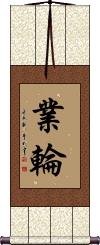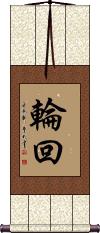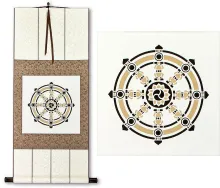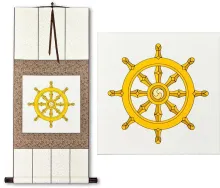Many custom options...
And formats...

Wheel of Karma in Chinese / Japanese...
Buy a Wheel of Karma calligraphy wall scroll here!
Personalize your custom “Wheel of Karma” project by clicking the button next to your favorite “Wheel of Karma” title below...
Wheel of Karma
Reincarnation / Transmigration of Souls
輪回 is a universal word in Japanese and Chinese that expresses the Buddhist idea of “reincarnation,” “transmigration of souls,” or “the eternal cycle of birth and death.”
In some contexts, this can also mean “karma,” and others will say it represents “samsara.”
The first character means wheel, ring, turn, circle, loop, or rotate.
The second character can be thought of as a suffix meaning “-times.” This second character can also refer to something that revolves, returns, goes back, or is a counter of the number of occurrences of some event.
Together the sum supersedes the parts, and it means reincarnation. But knowing the essence of each character may help you understand some of the meaning behind the word.
![]() Shown to the right is the more common way to write the second character in Japanese.
it’s
an alternate form of this character in Chinese (so neither way is technically wrong in either language). If you select a Japanese calligrapher, expect that is will look like the Kanji to the right.
Shown to the right is the more common way to write the second character in Japanese.
it’s
an alternate form of this character in Chinese (so neither way is technically wrong in either language). If you select a Japanese calligrapher, expect that is will look like the Kanji to the right.
This in-stock artwork might be what you are looking for, and ships right away...
Not the results for wheel of karma that you were looking for?
Below are some entries from our dictionary that may match your wheel of karma search...
| Characters If shown, 2nd row is Simp. Chinese |
Pronunciation Romanization |
Simple Dictionary Definition |
業輪 业轮 see styles |
yè lún ye4 lun2 yeh lun gōrin |
More info & calligraphy: Wheel of Karma |
輪 轮 see styles |
lún lun2 lun run るん |
wheel; disk; ring; steamship; to take turns; to rotate; classifier for big round objects: disk, or recurring events: round, turn (counter) counter for wheels and flowers; (female given name) Run cakra; wheel, disc, rotation, to revolve; v. 研. The three wheels are 惑業苦illusion, karma, suffering, in constant revolution. The five are earth, water, fire, wind, and space; the earth rests on revolving spheres of water, fire, wind, and space. The nine are seen on the tops of pagodas, cf. 九輪.; The two wheels of a cart compared by the Tiantai school to 定 (or to its Tiantai form 止觀) and 慧 meditation and wisdom; see 止觀 5. Also 食 food and 法 the doctrine, i. e. food physical and spiritual. |
三輪 三轮 see styles |
sān lún san1 lun2 san lun miwa みわ |
three wheels; (p,s,f) Miwa The three wheels: (1) The Buddha's (a) 身 body or deeds; (b) 口 mouth, or discourse; (c) 意 mind or ideas. (2) (a) 神通 (or 變) His supernatural powers, or powers of (bodily) self-transformation, associated with 身 body; (b) 記心輪 his discriminating understanding of others, associated with 意 mind; (c) 敎誡輪 or 正敎輪 his (oral) powers of teaching, associated with 口. (3) Similarly (a) 神足輪 ; (b) 說法輪 ; (c) 憶念輪 . (4) 惑, 業, and 苦. The wheel of illusion produces karma, that of karma sets rolling that of suffering, which in turn sets rolling the wheel of illusion. (5) (a) Impermanence; (b) uncleanness; (c) suffering. Cf. 三道. |
五障 see styles |
wǔ zhàng wu3 zhang4 wu chang goshou / gosho ごしょう |
(1) {Buddh} five hindrances (that prevent a woman from becoming a Buddha, a Brahmā, a Shakra, a devil king, or a wheel-turning king); five obstructions to women's attainment; (2) {Buddh} five hindrances (that impede ascetic practices; sensory desire, ill-will, sloth and torpor, restlessness and worry, doubt) The five hindrances, or obstacles; also 五礙; 五雲. I. Of women, i. e. inability to become Brahma-kings, Indras, Māra-kings, Caikravarti-kings, or Buddhas. II. The hindrances to the five 五力 powers, i. e. (self-) deception a bar to faith, as sloth is to zeal, anger to remembrance, hatred to meditaton, and discontent to wisdom. III. The hindrances of (1) the passion-nature, e. g. original sin; (2) of karma caused in previous lives; (3) the affairs of life; (4) no friendly or competent preceptor; (5) partial knowledge. |
十二因緣 十二因缘 see styles |
shí èr yīn yuán shi2 er4 yin1 yuan2 shih erh yin yüan jūni innen |
Dvādaśaṅga pratītyasamutpāda; the twelve nidānas; v. 尼 and 因; also 十二緣起; 因緣有支; 因緣率連; 因緣棘園; 因緣輪; 因緣重城; 因緣觀; 支佛觀. They are the twelve links in the chain of existence: (1) 無明avidyā, ignorance, or unenlightenment; (2) 行 saṃskāra, action, activity, conception, "dispositions," Keith; (3) 識 vijñāna, consciousness; (4) 名色 nāmarūpa, name and form; (5) 六入 ṣaḍāyatana, the six sense organs, i.e. eye, ear, nose, tongue, body, and mind; (6) 觸 sparśa, contact, touch; (7) 受 vedanā, sensation, feeling; (8) 愛 tṛṣṇā, thirst, desire, craving; (9) 取 upādāna, laying hold of, grasping; (10) 有 bhava, being, existing; (11) 生 jāti, birth; (12) 老死 jarāmaraṇa, old age, death. The "classical formula" reads "By reason of ignorance dispositions; by reason of dispositions consciousness", etc. A further application of the twelve nidānas is made in regard to their causaton of rebirth: (1) ignorance, as inherited passion from the beginningless past ; (2) karma, good and evil, of past lives; (3) conception as a form of perception; (4) nāmarūpa, or body and mind evolving (in the womb); (5) the six organs on the verge of birth; (6) childhood whose intelligence is limited to sparśa, contact or touch; (7) receptivity or budding intelligence and discrimination from 6 or 7 years; (8) thirst, desire, or love, age of puberty; (9) the urge of sensuous existence; (10) forming the substance, bhava, of future karma; (11) the completed karma ready for rebirth; (12) old age and death. The two first are associated with the previous life, the other ten with the present. The theory is equally applicable to all realms of reincarnation. The twelve links are also represented in a chart, at the centre of which are the serpent (anger), boar (ignorance, or stupidity), and dove (lust) representing the fundamental sins. Each catches the other by the tail, typifying the train of sins producing the wheel of life. In another circle the twelve links are represented as follows: (1) ignorance, a blind woman; (2) action, a potter at work, or man gathering fruit; (3) consciousness, a restless monkey; (4) name and form, a boat; (5) sense organs, a house; (6) contact, a man and woman sitting together; (7) sensation, a man pierced by an arrow; (8) desire, a man drinking wine; (9) craving, a couple in union; (10) existence through childbirth; (11) birth, a man carrying a corpse; (12) disease, old age, death, an old woman leaning on a stick. v. 十二因緣論 Pratītya-samutpāda śāstra. |
The following table may be helpful for those studying Chinese or Japanese...
| Title | Characters | Romaji (Romanized Japanese) | Various forms of Romanized Chinese | |
| Wheel of Karma | 業輪 业轮 | gōrin | yè lún / ye4 lun2 / ye lun / yelun | yeh lun / yehlun |
| Reincarnation Transmigration of Souls | 輪回 / 輪廻 轮回 | rin ne / rinne | lún huí / lun2 hui2 / lun hui / lunhui | |
| In some entries above you will see that characters have different versions above and below a line. In these cases, the characters above the line are Traditional Chinese, while the ones below are Simplified Chinese. | ||||
Successful Chinese Character and Japanese Kanji calligraphy searches within the last few hours...







